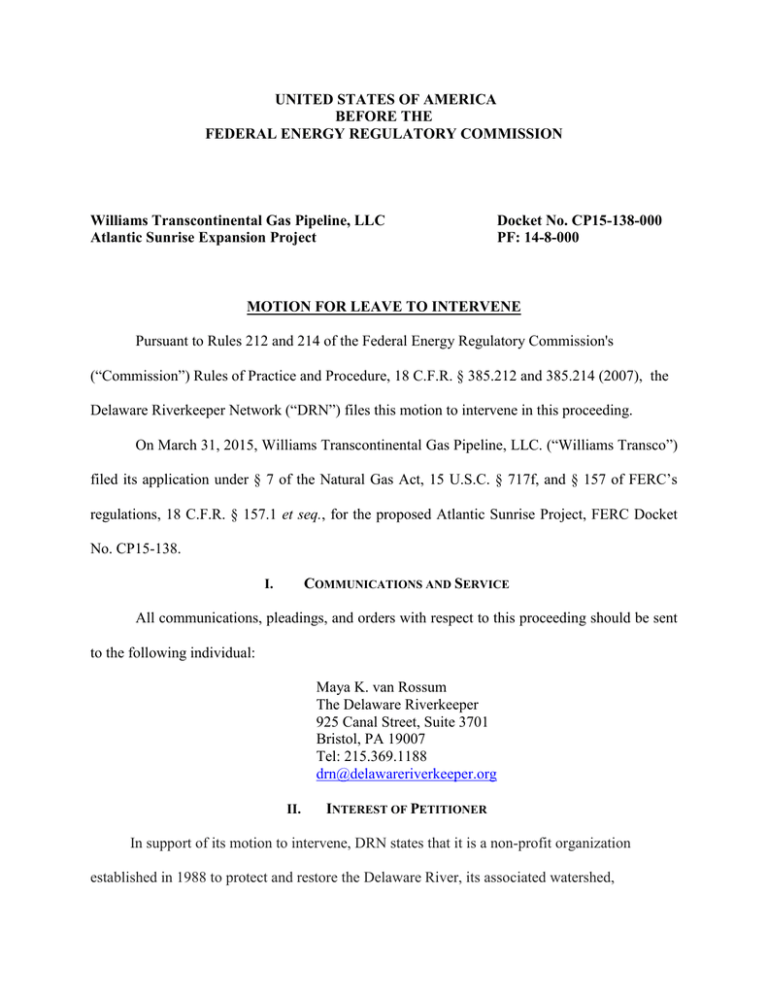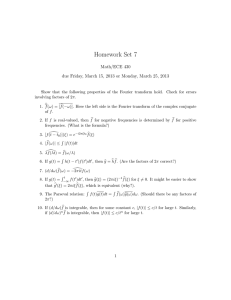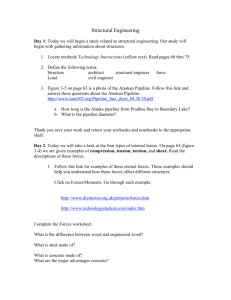UNITED STATES OF AMERICA BEFORE THE FEDERAL ENERGY
advertisement

UNITED STATES OF AMERICA BEFORE THE FEDERAL ENERGY REGULATORY COMMISSION Williams Transcontinental Gas Pipeline, LLC Atlantic Sunrise Expansion Project Docket No. CP15-138-000 PF: 14-8-000 MOTION FOR LEAVE TO INTERVENE Pursuant to Rules 212 and 214 of the Federal Energy Regulatory Commission's (“Commission”) Rules of Practice and Procedure, 18 C.F.R. § 385.212 and 385.214 (2007), the Delaware Riverkeeper Network (“DRN”) files this motion to intervene in this proceeding. On March 31, 2015, Williams Transcontinental Gas Pipeline, LLC. (“Williams Transco”) filed its application under § 7 of the Natural Gas Act, 15 U.S.C. § 717f, and § 157 of FERC’s regulations, 18 C.F.R. § 157.1 et seq., for the proposed Atlantic Sunrise Project, FERC Docket No. CP15-138. COMMUNICATIONS AND SERVICE I. All communications, pleadings, and orders with respect to this proceeding should be sent to the following individual: Maya K. van Rossum The Delaware Riverkeeper 925 Canal Street, Suite 3701 Bristol, PA 19007 Tel: 215.369.1188 drn@delawareriverkeeper.org II. INTEREST OF PETITIONER In support of its motion to intervene, DRN states that it is a non-profit organization established in 1988 to protect and restore the Delaware River, its associated watershed, tributaries, and habitats. This area includes 13,539 square miles, draining parts of Pennsylvania, New Jersey, New York, and Delaware. In its efforts to protect and restore the watershed, DRN organizes and implements stream-bank restorations, a volunteer monitoring program, educational programs, environmental advocacy initiatives, recreational activities, and environmental law enforcement efforts throughout the entire Delaware River Basin. DRN also provides technical assistance related to water quality monitoring and capacity building to Pennsylvania watershed groups. DRN is a membership organization headquartered in Bristol, Pennsylvania, with more than 15,000 members with interests in the health and welfare of the Delaware River and its watershed. DRN is uniquely qualified to comment on and provide relevant information concerning associated impacts to human health and the environment as a result of this Project. DRN brings this action on its own behalf and on behalf of its members, board, and staff. Based on information provided by William’s Transco in its October 2014 resource reports, the project is designed to be a large scale 42-inch transmission pipeline that will stretch approximately 178 miles. Over 3,507 acres will be impacted during construction of this pipeline, its above ground facilities, and modified above ground facilities. This project will have significant adverse environmental impacts, safety issues (i.e. explosions), economic ramifications, permanent impacts on scenery, and threaten drinking water sources, groundwater wells, and septic systems. DRN is concerned not only about the environmental, safety, and health impacts of the proposed construction activity, but also that Williams Transco may be improperly segmenting its expansion projects in order to avoid its responsibilities under NEPA, and to avoid having to do more rigorous environmental studies. Over the last several years the pipeline industry has developed a pattern of improperly segmenting pipeline upgrade projects to meet a perceived need of higher pipeline capacity for natural gas without conducting the proper environmental reviews. For example, the Tennessee Gas and Pipeline Company has initiated three projects that effectively close loops along portions of its existing line in Pennsylvania and New Jersey (i.e. the 300 Line Extension, Northeast Upgrade, and MPP Project). Each of these projects was brought individually before FERC, rather than as a unified project, despite the fact that they were constructed within a short time period and perform the functional equivalent to one large upgrade project. It is DRN’s concern that a similar strategy will likely be employed by Williams Transco for their pipeline upgrade projects, and that the Project is merely the one of several (including Transco’s Northeast Supply Link) functionally and operationally dependent projects. DRN is concerned that the Project is one of three applications to the Commission that Williams Transco has filed since Leidy Southeast Expansion (CP-13-551-000). Each of these projects leap-frog on the Leidy Pipeline system and the planned Atlantic Sunrise Project would add looping sections of pipeline filling in gaps along Transco’s Leidy line system, which would be located near the same geographic corridor as the proposed Atlantic Sunrise Project. In DRN’s scoping comments for Atlantic Sunrise Project (dated August 16, 2014) DRN requested that the Commission include a consideration of impacts resulting from all inter-related projects, including Cove Point, and their potential overlapping zones of impact, in its review of the Atlantic Sunrise Project. By considering the environmental impacts of these five inter-related and functionally inter-dependent projects in separate NEPA documents, rather than completing a full Environmental Impact statement to review upgrading the Leidy line system as a whole that includes the Atlantic Sunrise Project, the Commission is unlawfully segmenting its analysis in violation of its obligations under NEPA. Segments of Transco’s Leidy pipeline system cuts through portions of the Delaware River Basin. It is in the public’s interest that DRN takes part in this proceeding as a full participant. The Atlantic Sunrise Project, and others like it, fit into a larger picture of exploding shale gas development in the Marcellus Shale region. The increased development is not limited to the drilling of wells. FERC has reported that 5.6 billion cubic feet per day of pipeline capacity was constructed in the Northeast in 2008 and 2009, and an additional 1.2 billion cubic feet per day will have been constructed in the region by January 2011. Thus, the proposed Atlantic Sunrise Project is both a product of the development of the Marcellus Shale and other shales and a catalyst for further gas development. The impacts of the Project cannot be understood apart from the totality of the past, present, and reasonably foreseeable future actions associated with Marcellus Shale development and the development of other shales such as the Utica shale. III. CONCLUSION Wherefore, the Delaware Riverkeeper Network respectfully requests that the Commission grant this Motion to Intervene as a party with full rights to participate in all further proceedings. Respectfully submitted, Maya K. van Rossum the Delaware Riverkeeper 925 Canal Street, Suite 3701 Bristol, PA 19007 Tel: 215.369.1188 Fax: 215.369.1181 drn@delawareriverkeeper.org


